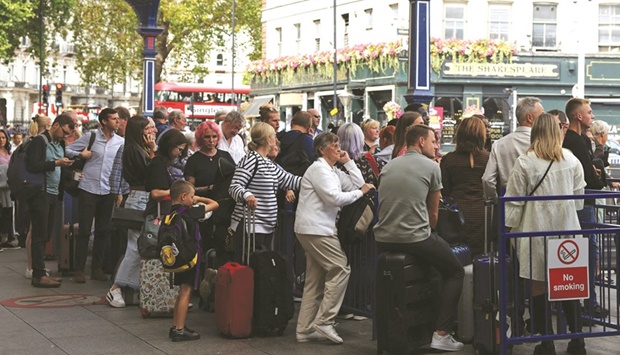British health leaders yesterday made an unprecedented appeal to the government to help the most vulnerable with the spiralling cost of energy to prevent a “public health emergency” this winter.
The NHS Confederation, one of the National Health Service’s umbrella organisations, said in a letter that people could be forced to choose between eating or heating as bills rise, with dire health impacts.
The situation could cause outbreaks of respiratory conditions, mental illness, worsen children’s life chances and add to pressure on the already stretched state-run National Health Service (NHS), the confederation added.
The warning comes as the UK’s inflation rate topped 10% for the first time in four decades last month, led by an unprecedented surge in consumer energy prices.
Gas and electricity bills are predicted to reach nearly triple the levels of late 2021 by next summer.
“As health leaders, we are clear that unless urgent action is taken by government this will leave an indelible scar on local communities and cause a public health emergency,” the confederation’s leaders said in the letter to Finance Minister Nadhim Zahawi.
The minister only started in the role last month, after dozens of ministers resigned from the government, prompting Prime Minister Boris Johnson to announce his resignation and a Conservative party leadership contest to replace him.
Foreign Secretary Liz Truss is the overwhelming favourite to succeed him when the result is announced on September 5, and is likely to announce a new finance minister.
She is yet to detail how she will help people in Britain through the cost-of-living crisis, other than vowing immediate tax cuts.
In their letter, NHS Confederation chief executive Matthew Taylor and chair Victor Adebowale said they had made “this unprecedented intervention as they know that fuel poverty will inevitably lead to significant extra demand on what are already very fragile services”.
“Many people could face the awful choice between skipping meals to heat their homes and having to live in cold, damp and very unpleasant conditions,” they added.
“This in turn could lead to outbreaks of illness and sickness around the country and widen health inequalities, worsen children’s life chances, and leave an indelible scar on local communities.”
The pair urged the government to unveil “a more targeted and detailed support package for those households who need it most”, ahead of the latest consumer energy price rises being announced next week.
Prime Minister Boris Johnson has resisted calls to provide more support to households struggling with higher bills, insisting his government will leave major fiscal decisions to the next prime minister who takes office in early September.
A spokesperson at Britain’s health department said the government was already helping households through a £37bn ($44bn) cost-of-living support package announced in May and was also working to increase NHS capacity.
Britain’s average annual household energy bills — covering both gas and electricity — look set to double again to more than £4,000 ($4,766) by January, exacerbating inflation which already topped 10% in July.

Passengers wait for taxis outside Victoria Station, London, yesterday as strike action on buses, National Rail and London Underground affects services.
